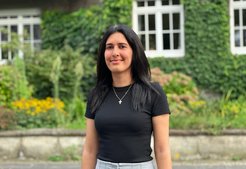Minerva’s daughters learn from each other
Dr. Leila Karam works on the synthesis of nanoparticles
Her way brought the young woman from Lebanon via Paris to Mülheim: Meet Dr. Leila Karam, postdoc in the group of Dr. Constanze Neumann.

Dr. Leila Karam comes from Lebanon. Since a couple of years, she has been working as Postdoc in the Group of Dr. Constanze Neumann in the Department of Heterogeneous Catalysis. Among other things, she is interested in synthesizing nanoparticles.
What brought you here? Tell us about your way to the Kohlenforschung!
Leila Karam: I finished my studies in Chemical Engineering with a minor in Petroleum Engineering in Lebanon. Then, I obtained a PhD in Physics and Chemistry of Materials at the Sorbonne University in Paris. After that, I was looking for interesting Postdoc positions – which was not easy during the pandemic. At a certain point, I came across an advertisement for an open position in the Group of Dr. Constanze Neumann and decided to apply. Fortunately, I was accepted. I came to the Kohlenforschung in November 2021 – and I am thrilled to be here.
What do you like about your job?
Leila: The wonderful aspect of working in science is that it is a field where you are constantly learning and adapting to new information and challenges. There is no routine – and this is perfect for me, as I hate routine. I really appreciate the warm and supportive atmosphere here at the institute, especially in our group. Everyone is more than happy to help.
What are your professional goals?
Leila: Honestly, my professional future is still open. All I know is that I want to bridge the gap between research and the real world. I would like to offer applications of our findings to tackle problems of our society. And there are still a lot of problems that need to be solved!
What has been your most difficult step so far?
Leila: I have moved from Lebanon to France and now to Germany. Going abroad and leaving my family and beloved ones behind was certainly not easy for me. On the other hand, challenging changes like this can also be very rewarding. By stepping out of my comfort zone, I had the opportunity to grow, to learn a lot about people and other cultures.
Who is your Role Model?
Leila: I do not really have a specific professional role model. Nevertheless, I admire all female scientists for overcoming immense challenges and enduring many obstacles. I know that I can benefit and learn from their experience and I am grateful for that. My ultimate and true role model, though, will always be my mother. She sacrificed so much for my siblings and I. I will never forget that.
What is your advice to young girls interested in a job in a scientific institution?
Leila: I would tell them to follow whatever they love to do! Science is a great field to work in. And if you are really passionate about your work, then it will be easy to stay committed and eventually overcome hindrances. You should also be aware of the fact that setbacks and failures are a natural part of science. Do not get demotivated from your mistakes – learn from them, they are opportunities for growth!
If you had one wish: What would it be?
Leila: I have so many wishes (laughing). If I had to pick one of them, I would wish for a world where people would always choose and prioritize peace, collaboration and investing more in science and research. We have still many problems in this world despite the significant advancements in technology and in my opinion, it is crucial to work on them together.












